
William James Dixon was an American blues musician, vocalist, songwriter, arranger and record producer. He was proficient in playing both the upright bass and the guitar, and sang with a distinctive voice, but he is perhaps best known as one of the most prolific songwriters of his time. Next to Muddy Waters, Dixon is recognized as the most influential person in shaping the post–World War II sound of the Chicago blues.

Marion Walter Jacobs, known as Little Walter, was an American blues musician, singer, and songwriter, whose revolutionary approach to the harmonica had a strong impact on succeeding generations, earning him comparisons to such seminal artists as Django Reinhardt, Charlie Parker and Jimi Hendrix. His virtuosity and musical innovations fundamentally altered many listeners' expectations of what was possible on blues harmonica. He was inducted into The Rock and Roll Hall of Fame in 2008, the first and, to date, only artist to be inducted specifically as a harmonica player.

"Mannish Boy" is a blues standard written by Muddy Waters, Mel London, and Bo Diddley. First recorded in 1955 by Waters, it serves as an "answer song" to Bo Diddley's "I'm a Man", which was in turn inspired by Waters' and Willie Dixon's "Hoochie Coochie Man". "Mannish Boy" features a repeating stop-time figure on one chord throughout the song.

James Milton Campbell Jr., better known as Little Milton, was an American blues singer and guitarist, best known for his number-one R&B single "We're Gonna Make It". His other hits include "Baby, I Love You", "Who's Cheating Who?", and "Grits Ain't Groceries ".
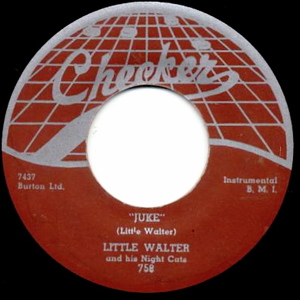
"Juke" is a harmonica instrumental recorded by the Chicago bluesman Little Walter Jacobs in 1952. Although Little Walter had been recording sporadically for small Chicago labels over the previous five years, and had appeared on Muddy Waters' records for Chess Records since 1950, "Juke" was Little Walter's first hit, and it was the most important of his career. Due to the influence of Little Walter on blues harmonica, "Juke" is now considered a blues harmonica standard.
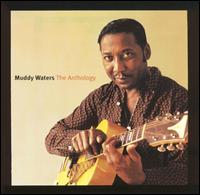
The Anthology: 1947–1972 is a double compilation album by Chicago blues singer and guitarist Muddy Waters. It contains many of his best-known songs, including his R&B single chart hits "I'm Your Hoochie Coochie Man", "Just Make Love to Me ", and "I'm Ready". Chess and MCA Records released the set on August 28, 2001.

"Goin' Down Slow" or "Going Down Slow" is a blues song composed by American blues singer St. Louis Jimmy Oden. It is considered a blues standard and "one of the most famous blues of all".
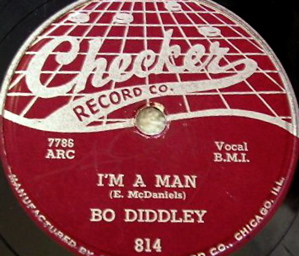
"I'm a Man" is a rhythm and blues song written and recorded by Bo Diddley in 1955. Inspired by an earlier blues song, it was one of his first hits. "I'm a Man" has been recorded by a variety of artists, including the Yardbirds, who adapted it in an upbeat rock style.
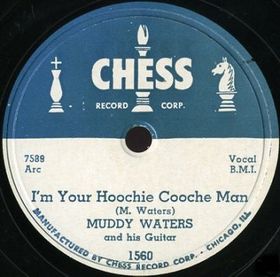
"Hoochie Coochie Man" is a blues standard written by Willie Dixon and first recorded by Muddy Waters in 1954. The song makes reference to hoodoo folk magic elements and makes novel use of a stop-time musical arrangement. It became one of Waters' most popular and identifiable songs and helped secure Dixon's role as Chess Records' chief songwriter.
"Wang Dang Doodle" is a blues song written by Willie Dixon. Music critic Mike Rowe calls it a party song in an urban style with its massive, rolling, exciting beat. It was first recorded by Howlin' Wolf in 1960 and released by Chess Records in 1961. In 1965, Dixon and Leonard Chess persuaded Koko Taylor to record it for Checker Records, a Chess subsidiary. Taylor's rendition quickly became a hit, reaching number thirteen on the Billboard R&B chart and number 58 on the pop chart. "Wang Dang Doodle" became a blues standard and has been recorded by various artists. Taylor's version was added to the United States National Recording Registry in 2023.

The Best of Little Walter is the first LP record by American blues performer Little Walter. First released in 1958, the compilation album contains ten Little Walter songs that appeared in the Top 10 of the Billboard R&B chart from 1952 to 1955, plus two B-sides. The album was first released by Checker Records as LP-1428, which was the first LP record released by Checker, and then released on Chess Records with the same catalog number.
"I'm Ready" is a blues song written by Willie Dixon and first recorded by Muddy Waters in 1954. It was a hit, spending nine weeks on the Billboard R&B chart where it reached number four. The song became a blues standard and has been compared to "Hoochie Coochie Man", the standard also written by Dixon that Waters recorded earlier in 1954.

"Just Your Fool" is a rhythm and blues-style song written and recorded by the American jazz and jump blues bandleader/pianist Buddy Johnson and His Orchestra in 1953. Called an "R&B anthem", the song has a big-band arrangement and his sister Ella Johnson on vocals—her "delicate and deceptively sweet phrasing was ideally suited to ballads such as this". "I'm Just Your Fool" became a Billboard R&B chart record hit, reaching number six in 1954.
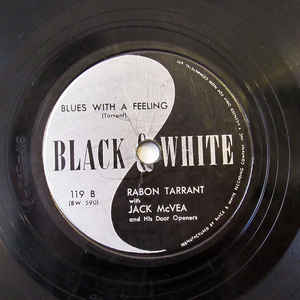
"Blues with a Feeling" is a blues song written and first recorded by Rabon Tarrant with Jack McVea and His All Stars in 1947, as the B-side of "Slowly Goin' Crazy Blues". Although the original release was commercially unsuccessful, the song later became an important hit for Little Walter, with whom it is usually identified.

"Pretty Thing" is a 1955 song written by Bo Diddley and Willie Dixon and performed by Bo Diddley. The song was Diddley's third single release through Checker Records after "Diddley Daddy". In 1963, the song was released in the United Kingdom where it became Diddley's first of only two songs appearing on the UK Singles Chart, the other single being "Hey Good Lookin'".

His Best is a greatest hits album by Chicago blues harmonica player Little Walter, released on June 17, 1997 by MCA and Chess Records as a part of The Chess 50th Anniversary Collection. The album is seen as the CD successor to the 1958 The Best of Little Walter and features ten of the songs from that album.
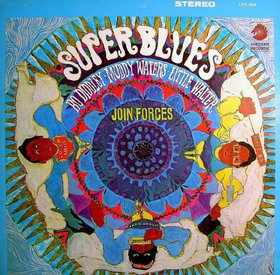
Super Blues is a 1967 studio album by a blues supergroup consisting of Bo Diddley, Muddy Waters, and Little Walter. The album was released in both mono and stereo formats by Checker Records in June 1967. A follow-up album The Super Super Blues Band was released later that year and featured Howlin' Wolf replacing Little Walter.
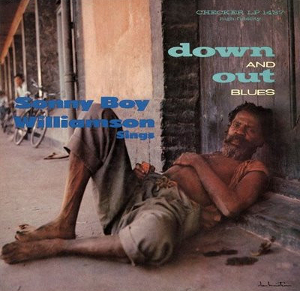
Down and Out Blues is the first LP record by American blues musician Sonny Boy Williamson. The album was released in 1959 by Checker Records.
"Hate to See You Go" is a blues song written and recorded by Chicago blues artist Little Walter. In 1955, Checker Records released it as one of three singles by Walter that year. The song, a one chord modal blues, is a reworking of "You Don't Love Me", written by Bo Diddley and recorded one month prior.
Little Walter (1930–1968) was an American blues artist who is generally regarded as the most influential blues harmonica player of his era. Most of his earliest recordings were as a sideman, when he contributed harmonica to songs by Chicago blues musicians such as Jimmy Rogers and Muddy Waters. As the featured artist, he recorded the instrumental "Juke" in 1952. The single reached number one on the Billboard Rhythm and Blues chart and launched his career as a solo artist.
















